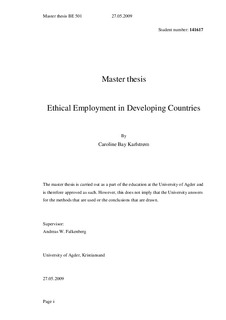| dc.description.abstract | The topic of this paper is ethical employment in developing countries, and how
multinational companies should conduct business in less developed countries.
First three theories within ethics will be covered; utilitarianism, justice and human
rights. Those are used to judge whether a case is unethical or not. Thereafter are the
employees rights covered, and two international conventions that protects these rights
are described; the International Labour Organizations and the UN Global Compact. The
first is based on the country’s participation, while the latter demands the individual
company to sign up. The next part in the theory chapter is code of ethics; how they
should be written and implemented. Two examples of companies are given; in order to
show how a code of ethics can be written and applied. The theory is wrapped up by
showing the differences between developed and developing countries, with focus on
cultural differences.
As methodology; case studies have been chosen. Four cases are studied to show
different unethical situation within employment in developing countries:
The dark secret of chocolate; which describes the extent of child labour at cocoa
plantations in the Ivory Coast, and the chocolate producer: Kraft Foods handling
of this.
Gap’s labour problem in Saipan, and the abuse of immigrant workers.
Hydro Agri Trinidad, and their absent safety measures, which resulted in
fatalities.
Rimi Baltic who avoided paying a living wage, and were uncooperative in the
unionization process.
All the cases were unethical to a certain extent, violated the human rights and abused
the employees in several ways. The international conventions were not followed, and all
the companies broke their own codes of ethics. However, the quality of the codes
varied, as well as the actions of the companies. Responsibility was not admitted by all,
and therefore justice is not seen for all employees. Nevertheless the major part of the
companies tried to solve the problems; however a solution was not always easy to
discover, or implement because of inadequate institutions. Conduction business on an
international arena is challenging, and doing it ethically is not always possible. The
company’s intensions and transparency against social responsibility is of importance. | en |
